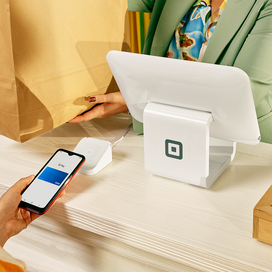Table of contents
Most retailers look forward to the spike in sales the holidays usually bring. Whether your business is brick and mortar, online, or somewhere in between, hiring seasonal workers can help you serve your customers better during the holiday rush.
According to the National Retail Federation, retailers hired 576,800 seasonal employees during November and December last year, and they would have hired more if they could.
This year, your holiday hiring needs are probably different. If you have a physical store, you may require extra staff to handle socially distant store layouts and curbside pick-up or deliveries.
By starting early, you can avoid being short-staffed during the holiday rush.
Get the word out now
You can find holiday workers in a few different ways. Here’s a game plan for sourcing candidates and creating a full pipeline.
Include holiday-specific details
Holiday workers may plan on having multiple jobs, so it’s important to lay out all of your scheduling requirements in the job description. Include the days and hours you need, along with any times you need your employee to be on call.
Be clear about the specific holidays when you’d need someone to be available, so you don’t waste time interviewing candidates that won’t work out.
Post positions early
Seasonal workers may be starting their holiday job search early due to higher unemployment. If your openings are among the first posted, you’ll get the first chance at attracting talented applicants. Most retailers start posting jobs in early fall, and 94% of seasonal jobs are filled by the end of November, according to the job search engine Snagajob.
The first step is to post your openings on your website. Add a “We’re Hiring” banner to your homepage to grab visitors’ attention, or use a Careers page to post openings.
Take advantage of hiring websites like Indeed, FlexJobs, and ZipRecruiter. Snagajob focuses on hourly positions, and has a section specifically for seasonal work.
Use social media
Your social media profiles can also help you find talented candidates, so be sure to share your open roles with your followers. This group will already be familiar with your company, and you never know if they’re looking for a job. It’s also a good way to reach workers you’ve hired for previous holiday seasons.
You may also want to experiment with posting on local platforms, like Nextdoor or college listservs, to reach students who may not be returning to campus in the fall.
Make your posts engaging and relevant to where you’re publishing them. For example, on Instagram you could add photos of your team following safety protocols while fulfilling pickup orders. Or take a photo of your front door lit up with holiday decorations and a “Help Wanted” sign. You can also update your LinkedIn profile and share that you’re hiring for the holidays in your headline or through a separate post.
Ask for employee referrals
Referrals are more likely to accept job offers, according to research from Harvard University. Speed is your friend during the holidays, so ask your team if they know anyone looking for a temporary job who might be a good fit.
To get the referrals flowing in, consider offering bonuses to employees who refer successful candidates.
Identify the right candidates
When you interview a temporary worker, some of your questions should address the seasonality of the role. In addition to your usual interview questions (why do you want to work here?) ask a few that apply directly to the traits required to be a good seasonal employee, like how they’ve resolved tough customer situations and how they prefer to learn new tasks.
Flexibility
Your store hours may include nights and weekends, and you may decide to change up your team’s job duties to meet holiday customer demand. Make sure your candidate has the availability you need, and is open to taking on different tasks. If someone’s schedule doesn’t match up with yours, it could be a red flag that they won’t work out once the busy season is underway.
Some candidates may hope to continue working for you full time after the holidays are over. Be honest with them about the length of the role. If you end up hiring someone who really wants a permanent position, they may quit if one comes along. You don’t want that, especially during the holiday rush.
Experience
Seasonal employees who have retail experience come with some advantages. And if they’re worked retail during the holidays, even better.
First, they understand the industry and what’s required, which can help manage expectations. They may also already know how to use your tools and follow basic procedures. While every store will do things differently this holiday season, having a basic understanding will help speed up the training process.
Candidates who have worked in retail before may also have new and fresh ideas to improve your business.
Enthusiasm
The timeframe for seasonal work may be finite, but you still want to aim to hire a motivated and productive team for your busy season. An engaged employee will treat shoppers better, and research from McKinsey shows that it also improves customer satisfaction. Connecting with customers is essential this holiday season, since the way you sell may have changed.
As you conduct the interview, look for signs that the person wants the job and wants to work for your business during the holidays. For example, they may share their favorite holiday gifts that you sell or ask for follow-up steps once the interview is over.
Create a post-hiring onboarding plan
Don’t overlook the onboarding process for your seasonal hires. Focus on the things that will get them started quickly, like understanding store policies and filling out the right new hire paperwork.
You’re coming into your busy season, and it can help if you start new employees on a day or time that isn’t as hectic, like a weekday morning.
Make sure they understand your mission, and help them feel like they’re an important part of the team. If you offer your full-time employees a holiday discount, for example, provide it to your seasonal workers too. When an employee feels valued, they’re more likely to offer the same level of service to your customers that your regular staff provides.
You may decide to assign tasks that are easier to learn, like stocking shelves, running packages to curbside customers, or refilling supplies. Then communicate these expectations to the entire team so your new hires can form a good working relationship with your existing crew. Helping the team bond can also make it easier if they have to swap shifts, which is likely to happen with different holiday schedules.
It won’t be long before the holidays are here. By starting the hiring process for seasonal employees now, you can ensure that your busy season is as stress-free as possible.
Learn more about how businesses scale their teams with Square Shifts here.![]()
![]()












